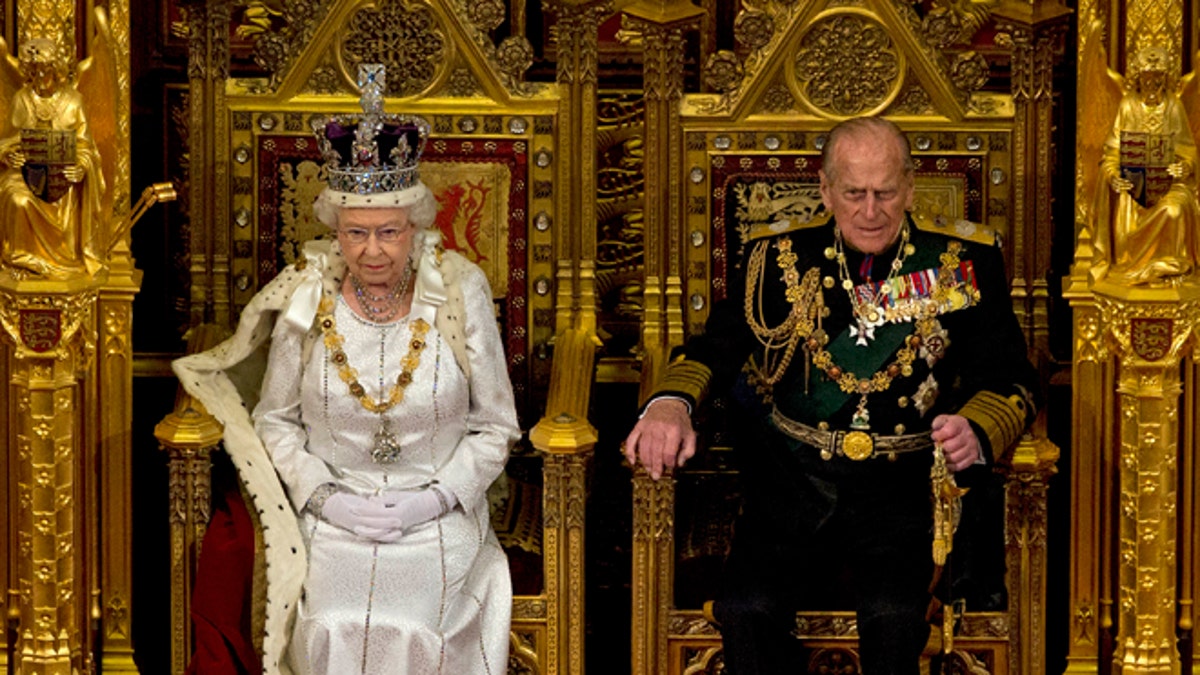
May 9, 2012: Britain's Queen Elizabeth II sits next to Prince Philip in the House of Lords as she waits to read the Queen's Speech to lawmakers in London. (AP)
LONDON – Wearing a crown studded with glittering jewels, Queen Elizabeth II set out Britain's new legislative agenda in traditionally opulent style Wednesday, announcing a frugal program aimed at boosting economic growth.
In the annual pageant of power, pomp and politics, the queen read aloud Britain's new legislative package, which sets out the work of Parliament over the next 12 months and included overhauling the unelected House of Lords, a project that has been delayed for decades.
Hundreds of people lined the streets outside Parliament to see the monarch's horse-drawn carriage parade from Buckingham Palace in a lavish ceremony featuring gleaming coaches, sparkling diamonds and canon fire.
[pullquote]
However, the queen has no role in drafting the content of her speech, which is written by Britain's government. All proposed bills must be debated and approved by lawmakers -- with votes in Parliament if necessary -- before any can become new laws.
"My ministers' first priority will be to reduce the deficit and restore economic stability," the queen said, speaking from a gilded throne in the House of Lords, packed with peers wearing traditional red robes lined with gold and ermine.
In a foreword to their new agenda, Prime Minister David Cameron and Deputy Prime Minister Nick Clegg acknowledged that Britain's economic woes continued to dominate their work two years after they formed a rare coalition government following the indecisive 2010 election.
"The primary task of the government remains ensuring that we deal with the deficit and stretch every sinew to return growth to the economy," they wrote.
In an apparent swipe at France and Greece over plans there to shun austerity measures, they wrote that Britain would "keep spending down ... unlike others in Europe."
Both Cameron's Conservative Party and Clegg's Liberal Democrats suffered heavy losses in local elections last week, as voters punished them for spending cuts that are seeing welfare payments trimmed and about 700,000 public sector jobs axed.
Labor unions plan to march on Parliament on Thursday to protest the government's four-year program of 81 billion pounds ($130 billion) in spending cuts. Treasury chief George Osborne has already warned Britain will likely need two more years of austerity after the 2015 national election.
Last month, Britain's economy slumped back into recession for the first time since 2009 and critics say that was due to the government's austerity program.
"The main obstacle remains the government's mistaken policies of austerity that have sent the economy back into reverse," said Brendan Barber, general secretary of the Trades Union Congress.
Grass-roots Conservatives had urged Cameron to ditch plans to use the coming year to pursue a reform of the House of Lords -- insisting his priority should be on the economy.
Peers have frequently opposed any changes to Britain's unelected 700-year-old upper chamber, and a new attempt to force through reforms will require lengthy debates in Parliament. The chamber now has 782 members.
The queen -- who wore the Imperial State Crown studded with almost 3,000 diamonds -- confirmed that the government was seeking to introduce a smaller, mainly elected chamber which would offer its members fixed 15-year terms.
Although Tony Blair in 1999 reduced the number of hereditary peers in the House of Lords from 750 to 92, successive governments have struggled to win Parliament's approval for more radical changes.
On other topics, contentious plans to allow spy agencies to snoop on email traffic, Web browsing and interactions on social media sites have been published only in draft form, meaning they will be subject to further debate.
That will set up fierce new arguments between advocates for civil liberties and law enforcement authorities, who insist they need wider powers as terrorists use more sophisticated methods to communicate.
Other new bills will seek to cut regulation for businesses -- which could make it harder for workers who allege unfair treatment -- and offer shareholders new powers to curb directors' pay.
Seeking to safeguard Britain's banks from any repeat of the global economic crisis, the government will introduce a new law that will demand banks separate high street retail operations from riskier investment divisions. Only banks which cooperate will be permitted to offer day-to-day retail banking to the public and small businesses.
The package also confirmed government plans to allow TV cameras into some court hearings for the first time and aims to establish a new FBI-style crime fighting agency -- only six years after Britain last overhauled its approach to serious crime and drug trafficking.
New legislation on libel laws will seek to restrict the number of claims lodged by foreigners in Britain's courts in an effort to end the practice of libel tourism.
